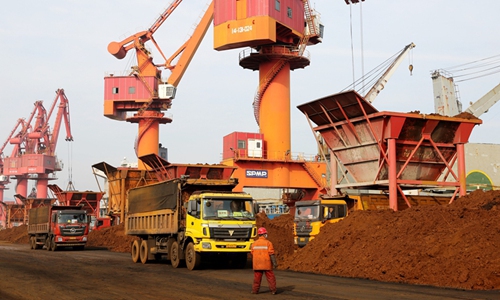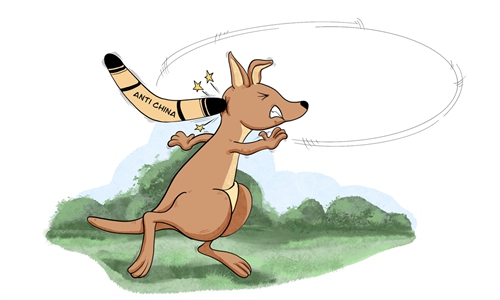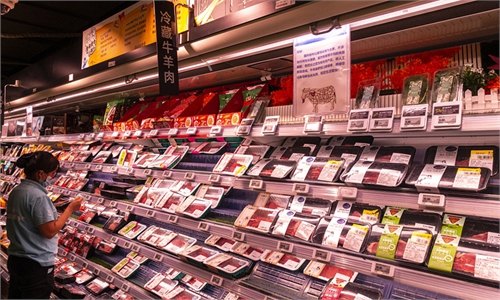US goods replace Aussie imports of frozen beef, barley and coal amid latter's deteriorating relations with China
Frozen beef, barley, and coal being substituted

Imported beef is sold in a supermarket in Shanghai on August 20, 2020. Photo: VCG
Chinese importers and companies are replacing Australian imports ranging from frozen beef, barley to coal with goods produced in other countries, including Australia's so-called ally the US, several business executives told the Global Times. This reflects Australia's embarrassing political scenario after it immaturely followed the US against China.
The changes came amid worsening China-Australia relations, which resulted in a severe drop in China's purchase of Australian products like barley. On the other hand, China is buying more of those goods from the US to fill the void.
South China Morning Post reported Australia's traditional lead over the US in frozen beef exports to China started to turn recently.
In April, the US exported $68 million worth of frozen beef to China, less than Australia's $80 million exports. In May, however, the US overtook Australia by exporting $90 million worth of frozen beef to China, almost doubling Australia's $47 million beef exports.
In July, the gap widened in favor of the US. US exports of frozen beef to China hit $107 million, compared with $35 million from Australia.
A manager from the Shenyang Huayue Foreign Economic And Trade Company told the Global Times that the firm has been importing more US beef recently to replace Australian beef, although he didn't mention the exact amount.
"It's difficult to import (Australian) beef since China-Australia disputes," he said, adding that Australian beef is more expensive than US ones.
Zhan Qiang, general manager of the Shanghai Wei'erbo Food Company, which processes and sells beef steak, also told the Global Times that his company has been gradually reducing sales of Australian beef. In the past, Australian beef accounts for about 30 percent of the firm's total purchases.
"Australian beef supplies are very unstable in the market. Purchasers often find them in short supply, and we have gradually given up using Australian beef," he told the Global Times, attributing the situation partly to the deteriorating China-Australia political environment.
Zhan said his company has used beef from South America, Canada and New Zealand to replace Australian beef. They also buy US beef to fill the gap, but not in large amounts.
He also noted that there's not much difference between Australian beef and other beef, apart from the fact that Chinese consumers used to have a friendlier attitude toward Australian goods.
Apart from frozen food, other Australian products are also facing increasing market chill. An employee from an agricultural trade company from Yancheng, East China's Jiangsu Province also told the Global Times that his company reduced imports of Australian barley to escape the 80 percent anti-dumping and anti-subsidy duties placed by China on Australian barley imports since last year, and is purchasing more from Argentina, France and Canada.
Coal exports are another example of the changes in trade. In April, China imported 974,000 tons of coking coal from the US, up from 279,000 tons in January, customs data showed. In comparison, Australia's exports of coal to China have almost dropped to zero.
Zhao Jianguo, secretary-general of China's Coal Transportation Association, told the Global Times that although US coal exports to China have increased, the increase is limited.
"The quality of US coal is relatively low, while the long distance between China and the US increases time and shipping costs," Zhao said. About two-thirds of China's coal imports come from Indonesia.
The fact that Australia is seeing its market share being stolen by US competitors despite the two countries' "alliance" against China shows Australia's "immature, wishing thinking" policymaking , experts said.
"Australia imagines that the US will be firm on its side, but actually it is losing market share to its so-called ally, and Australia is getting nothing but an embarrassing scenario," Chen Hong, a professor and director of the Australian Studies Centre at East China Normal University, told the Global Times. "It sees the US as a friend, but actually the US is a competitor of Australia because of their industrial overlap."
He said Australian politicians have not realized that Australian products are not unique and can be easily replaced in the Chinese market.
"They can't handle economic issues with a rational method, and it's Australian agricultural trade businesspeople that are taking the hit," he said.
He urged Australian politicians to "come back to their senses" to avoid a complete predicament in China-Australia relations. Otherwise, they will lose support from voters, since their policies have already harmed the Australian economy, he said.



